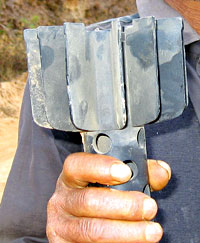Legally, just about every constitutional expert in this country agrees that King Gyanendra's direct rule has no de jure authority. Since October 4, 2002, the government has been operating on the basis of de facto power accumulated through a phased royal-military coup. The wishes of the king are his command, and his council of ministers doesn't really need laws enacted by royal ordinance to run the government.
Riot police arrested 37 journalists, lawyers and academics at New Baneswor on Wednesday. A day earlier, 50 madheshi protestors demonstrating peacefully were taken in. The government has issued even more draconian ordinances to hound political activists opposed to an interventionist monarchy.
Professionals have come out on the streets to register resistance. Teachers are protesting. Lawyers, engineers, doctors, students, employees of Nepal Telecom, media and financial institutions have joined to oppose the repressive policies.
Even civil servants have now decided to show their support.
Senior bureaucrats have not spoken out yet, but their humiliation at the hands of handpicked royalists is boiling over. The country has been in the grips of unprecedented political, administrative, and economic crisis for quite sometime, and something has to give.
Polarisation of all people's forces against the authoritarianism of the palace seems to be almost complete, though with an important caveat: the security forces are still in confusion about their roles and responsibilities in a conflict between the people and the regime.
In the People's Movement of 1990 too, the RNA was the last line of defence of the totalitarian Panchayat regime. The top brass took their time to decide that there was no future for a monarchy opposed to the wishes of the majority. Eventually the army used its influence and made a recalcitrant establishment see reason. History may repeat itself if the movement for democracy intensifies, but this time the response of the forces has to be quicker and more intense. The people's patience is running out.
|
|
The bombs killed four Maoists among a group that was holding a mass meeting at the school but also two civilians. And that is the problem with aerial attacks: it can cause civilian casualties.
The Maoists routinely violate the rules of war by meeting at schools and using civilian homes for shelter, and the army has been flouting norms by indiscriminate aerial bombardment. The destruction of one of the army's MI-17s used for aerial attacks in Malangwa on Wednesday night shows just how dangerous this war now is.
When a means of combat includes methods that is not just directed at a specific military target and can strike non-combatants it can be construed as a breach of international humanitarian law: so the Maoists were clearly in breach by using a school building and the army violated these norms by reckless endangerment.
The army says it took all precautions to 'minimise' civilian casualties but obviously those precautions weren't enough in Thokarpa. It says we in the media don't criticise the Maoists. But we do with coverage of the bomb in Dailekh at exam time last week, the Madi bus bomb. What the royal regime forgets is that the state is expected to live up to higher standards than the mindless violence of armed insurgents. It's time the security forces realised they are not mere instruments of the regime but thinking and compassionate Nepalis.
Mahatma Gandhi had once observed that the need for sacrifice and the duty to defy unjust laws were two higher calling for every individual living under any tyrannical regime. Those suppressing peaceful protests this week must remember that there is a higher calling. Nepali society expects nothing less from those it pays to protect.




